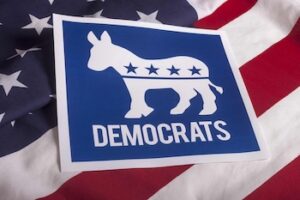
*On this date in 1828, the American Democratic Party was founded. Sometimes called the Democratic Farmer Labor Party (DFL), they are a center-left political party in the United States.
One of the major parties of the U.S., it is the world's oldest active political party. Its main adversary since the 1850s has been the right-wing Republican Party, and the two have dominated American politics for nearly 175 years. The Democratic Party was formed from remnants of the Democratic-Republican Party. Senator Martin Van Buren played the central role in building the coalition of state organizations that formed the new party as a vehicle to help elect Andrew Jackson as president that year. It initially supported Jacksonian democracy, agrarianism, and geographical expansionism, while opposing a national bank and high tariffs.
Democrats won six of the eight presidential elections from 1828 to 1856, losing twice to the Whigs. In 1860, the party split into Northern and Southern factions over slavery. The party remained dominated by agrarian interests, contrasting with Republican support for the big business of the Gilded Age. Democratic candidates won the presidency only twice between 1860 and 1908, though they won the popular vote two more times in that period. During the Progressive Era, some factions of the party supported progressive reforms, with Woodrow Wilson being elected president in 1912 and 1916.
In 1932, Franklin D. Roosevelt was elected president after campaigning on a strong response to the Great Depression. His New Deal WPA programs created a broad Democratic coalition that united White southerners, Northern workers, labor unions, African Americans, Catholic and Jewish communities, progressives, and liberals. From the late 1930s, a conservative minority in the party's Southern wing joined with Republicans to slow and stop further progressive domestic reforms.
After the 20th-century American civil rights movement and Great Society era of progressive legislation under Lyndon B. Johnson, who was often able to overcome the conservative coalition in the 1960s, many White southerners switched to the Republican Party as the Northeastern states became more reliably Democratic. The party's labor union element has weakened since the 1970s amid deindustrialization, and during the 1980s it lost many White working-class voters to the Republicans under Ronald Reagan. In 1989, Ron Brown became the first African American to serve as chairman of the Democratic (or any major political party. The election of Bill Clinton in 1992 marked a shift for the party toward centrism and the Third Way, shifting its economic stance toward market-based policies.
Barack Obama oversaw the party's passage of the Affordable Care Act in 2010. In the 21st century, the Democratic Party's strongest demographics are urban voters, college graduates, African Americans, women, younger voters, irreligious voters, the unmarried, and LGBTQ people. On social issues, it advocates for abortion rights, LGBTQ rights, action on climate change, and the legalization of marijuana. On economic issues, the party favors healthcare reform, paid sick leave, paid family leave, and supporting unions. In foreign policy, the party promotes liberal internationalism as well as strong opposition to China and Russia. In 2024, Kamala Harris was the party's nominee for president.